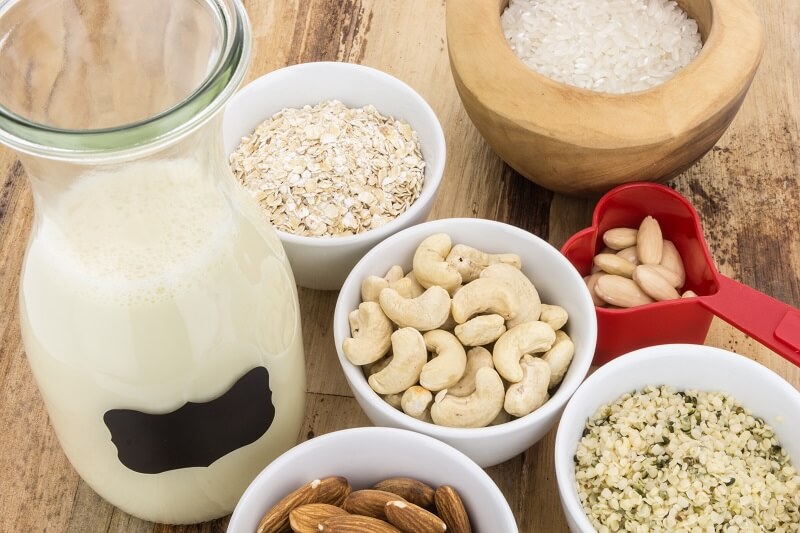Grain milking, nut milking: Plant milk at a glance
- Soy milk: a reliable classic
- Almond milk: a strong second place
- Coconut milk: a classic rediscovered
- Rice milk: the lean of the lean
- Oat milk: light and nutritious
- Millet milk: for gluten-free people
- Hemp milk: a protein powerhouse
- Spelt milk: not just for grain coffee
- Buckwheat milk: Still waiting for its chance
Although cow's milk is still by far the most widely consumed milk in Poland and around the world, its plant-based alternatives are rapidly gaining popularity. Gone are the days when it was unusual to order soy milk in a café: On the contrary, there are so many plant-based options on supermarket shelves and online that it can sometimes be overwhelming!
While cow's milk is usually simply classified into several types based on its fat content (and a lactose-free version has recently become available), plant milks—beverages made by mixing nuts or seeds with water and pressing the resulting liquid—vary depending on the plant they come from. They have a variety of flavors, textures, and often even colors—and, most importantly, uses. That's why we've compiled a list of the most popular types of plant milk for anyone just beginning their adventure with these delicious, nutritious, and, importantly, animal-free beverages.
Soy milk: a reliable classic
Soy milk was the first plant-based beverage to gain widespread popularity, and despite growing competition, it remains the beverage most often sought after by people who avoid cow's milk. Its consistency, properties, and nutritional values are similar to cow's milk, making it suitable for all its traditional uses: baking and cooking, whitening coffee, pouring over porridge or breakfast cereals, and even—especially in vanilla flavored versions, for example—for drinking.
Almond milk: a strong second place
If any beverage could dethrone soy milk as the most popular vegan alternative to cow's milk, it would be almond milk . Its consistency resembles skim cow's milk, and the flavor should be distinctly almond. It has less protein and fat, and therefore fewer calories, than soy milk, but is generally considered more palatable. It can be substituted for cow's milk in almost all applications.
Coconut milk: a classic rediscovered
Coconut milk is a traditional ingredient in the cuisine of many Asian countries, especially Thai cuisine. It only became really popular in Poland a few years ago. There are two types of coconut milk: canned and cartoned. Canned coconut milk is much thicker and fattier than cartoned milk and has different uses: it is best suited for cooking and making desserts. After about a day in the refrigerator, it separates into two fractions: lean and fatty. The fat can even be used to make vegan whipped cream! Due to its thick consistency and high fat content, some people use it instead of cream in coffee, but its intense coconut flavor makes it an option for ko(ko) desserts. Cartoned coconut milk has a very delicate flavor, the consistency of a typical plant-based milk, and can be used like almond or soy milk.
Rice milk: the leanest of the lean
If you're looking for something that's only slightly different from water, rice milk is a good option. It's also a good choice for people who are allergic to lactose, soy, nuts, and gluten.
Oat milk: light and nutritious
With a slightly grainy flavor, oat milk has less protein than most other milks (except rice milk), but, as befits an oat milk , it contains a decent amount of fiber. It's suitable for all common uses, but hardly suitable for coffee (although that's a matter of taste).
Millet milk: for gluten-free people
Millet has become very popular lately—and that's a good thing, because it's delicious and healthy! Millet milk has a distinctive yellowish color. It contains no gluten, making it suitable for people who avoid this protein. It has a slightly bitter aftertaste, and some describe it as slightly cheesy. It doesn't work well in coffee or cereal, but you can use it in cooking.
Hemp milk: a protein powerhouse
Hemp is one of the richest plants in complete protein: It's no surprise that the beverage made from it also contains a large amount of this ingredient (comparable to soy milk)! It tastes somewhat milky and nutty, has a slightly creamy consistency, and... sometimes a slightly creepy greenish color. But don't let that fool you: It's a great substitute for cow's milk, good for all its typical uses! It's also suitable for people with nut allergies.
Spelt milk: not just for grain coffee
Another great alternative to cow's milk: It's even great for making cappuccinos because it froths well. It has a delicate, slightly grainy, and nutty flavor and a distinctive beige color. Thanks to the naturally occurring sugars, it's slightly sweet even without the addition of sweeteners.
Buckwheat milk: Still waiting for its chance
One of the least popular types of milk—and it's hard to say exactly why. It's delicious, slightly sweet, and packed with nutrients. It's a great substitute for cow's milk and is also suitable for gluten-free people and those with nut allergies.
THE PUBLISHER'S CHOICE
Dried plums 1 kg BIOGO
- £6.08
- £6.08
- Unit price
- / per
Dried White Mulberries 500 g ORGANIC
- £5.06
- £5.06
- Unit price
- / per
Almonds 1 kg BIOGO
- £10.13
- £10.13
- Unit price
- / per
Cranberries sweetened with apple juice organic 1 kg BIOGO
- £14.19
- £14.19
- Unit price
- / per
Dried dates 1 kg BIOGO
- £3.65
- £3.65
- Unit price
- / per
Unpeeled buckwheat groats 1 kg BIOGO
- £2.44
- £2.44
- Unit price
- / per
Walnuts 800 g BIOGO
- £7.50
- £7.50
- Unit price
- / per
Peeled sunflower seeds 1 kg BIOGO
- £2.64
- £2.64
- Unit price
- / per
PULLED ORGANIC SUNFLOWER SEEDS 1 KG BIOGO
- £3.85
- £3.85
- Unit price
- / per












































































































































